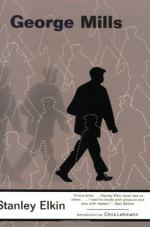|
This section contains 315 words (approx. 2 pages at 300 words per page) |

|
George Mills represents Elkin's most ambitious adaptation of the picaresque tradition, which has its English origins in the eighteenth-century narratives of Henry Fielding and Laurence Sterne, In these novels, the organizing principle is the adventures of the central character, often a rascal or a social pariah.
Elkin developed this method as early as his first novel Boswell: A Modern Comedy (1964), and his stock in trade has been the adventures, told in episodic manner, of a rogue-hero. In this book, we have three variations on the motif, with distinctive styles and motifs for each Mills's saga.
Another typical Elkin motif involves humor and anachronism. Like Joseph Heller in God Knows (1984), Elkin playfully re-arranges chronology to deny the power of history. When Greatest Grandfather prevents a slaughter by barbarians who surround them as he and Guillalume flee, he quotes the nineteenth-century spiritual, "ain't gonna study war no more...
|
This section contains 315 words (approx. 2 pages at 300 words per page) |

|




